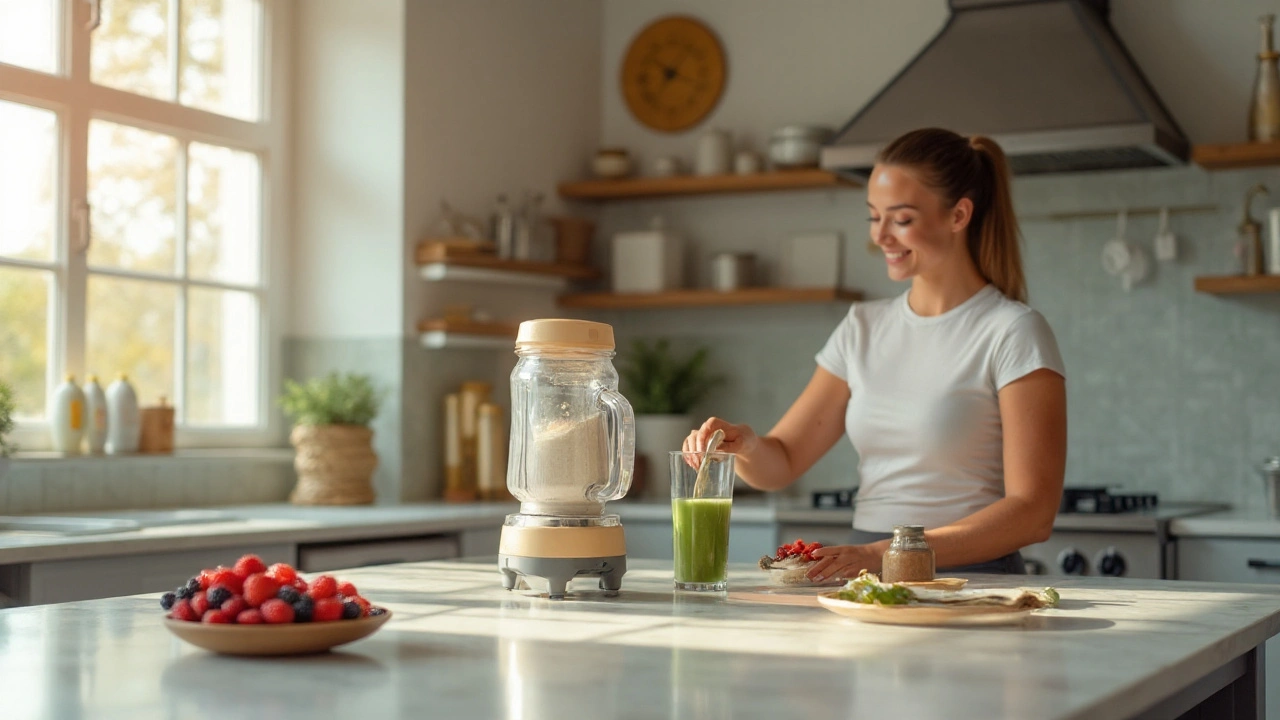Soy Dietary Supplements are a class of nutritional products that harness soy's rich protein, fiber, and phyto‑active compounds to support overall health. They come in powders, capsules, and fortified foods, each delivering a specific blend of soy‑derived nutrients such as soy isoflavones, soy protein, and fermented soy peptides. In 2023, global sales of soy supplements topped $2.5billion, reflecting growing consumer interest in plant‑based wellness solutions.
Quick Take
- Isoflavone‑rich capsules are best for hormone balance.
- Protein powders excel at muscle recovery and satiety.
- Fermented soy blends boost gut health.
- Look for third‑party testing to ensure purity.
- Price ranges vary from $15 to $80 per month.
How Soy Supplements Work
When you consume a soy supplement, its bioactive components interact with your body in three core ways:
- Protein synthesis: Soy protein provides all nine essential amino acids, triggering muscle repair and supporting metabolic rate.
- Phytoestrogen modulation: Isoflavones mimic weak estrogen, helping balance hormone fluctuations during menopause or thyroid issues.
- Gut microbiome support: Fermented soy products deliver live cultures and short‑chain fatty acids that nurture beneficial bacteria.
These mechanisms make soy supplements versatile tools for nutrition, hormone health, and digestive wellbeing.
Key Soy‑Derived Nutrients You’ll Find
Below are the most common soy components packed into supplements, each with its own health profile.
- Soy Isoflavones are plant‑based phytoestrogens that include genistein, daidzein, and glycitein. Clinical trials (2021, Journal of Nutrition) show they can reduce hot‑flash frequency by up to 45%.
- Soy Protein delivers 20-25g of protein per serving, with a digestibility‑corrected amino acid score of 98, making it comparable to dairy whey.
- Soy Peptides are short chains of amino acids created through enzymatic hydrolysis. They have been linked to improved blood pressure regulation.
- Soy Fiber adds soluble and insoluble fiber, helping lower LDL cholesterol by 7% in controlled studies.
- Fermented Soy (e.g., natto or tempeh extracts) introduces probiotic strains like Bacillus subtilis, supporting intestinal barrier function.
Top 10 Soy Supplements - In‑Depth Review
| Brand | Main Soy Form | Typical Daily Dose | Key Benefit | Price (30days) |
|---|---|---|---|---|
| Nature's Way Soy Isoflavones | Isoflavone capsules | 2capsules (80mg) | Menopause symptom relief | $22 |
| Vega Soy Protein Powder | Protein isolate | 1 scoop (30g) | Muscle recovery & satiety | $35 |
| NOW Foods Soy Peptide Complex | Peptide capsules | 3capsules (150mg) | Blood pressure support | $28 |
| Garden of Life Organic Soy Fiber | Fiber powder | 2tbsp (10g) | Cholesterol & gut health | $19 |
| Jarrow Formulas Fermented Soy Blend | Fermented soy extract | 1tablet (500mg) | Probiotic & digestion | $31 |
| Purely Inspired Soy Lecithin Capsules | Lecithin softgels | 2softgels (1200mg) | Brain health & lipid metabolism | $24 |
| Sunwarrior Soy Protein Isolate | Protein isolate | 1 scoop (32g) | Low‑calorie muscle builder | $38 |
| Vital Nutrients Soy Phytosterol Complex | Phytosterol capsules | 2capsules (200mg) | Heart‑healthy cholesterol control | $27 |
| Enzymedica Soy Enzyme Boost | Enzyme‑enhanced soy | 1tablet (250mg) | Improved protein digestion | $32 |
| NutraBio Soy Omega‑3 Blend | Soy‑derived omega‑3 | 3softgels (900mg) | Anti‑inflammatory & joint support | $45 |
Choosing the Right Soy Supplement for Your Goals
Not all soy products serve the same purpose. Use this quick decision tree to match your primary wellness goal with the most effective supplement type:
- Hormone balance or menopausal comfort? Go for soy isoflavone capsules (e.g., Nature's Way).
- Muscle gain, post‑workout recovery? Choose soy protein powders with a high PDCAAS score (Vega, Sunwarrior).
- Digestive health? Fermented soy blends or soy fiber powders are best.
- Heart health? Phytosterol and lecithin formulas target cholesterol.
- Joint pain or inflammation? Soy‑derived omega‑3 offers a plant‑based alternative to fish oil.
Remember to verify third‑party certifications (NSF, Informed‑Sport) to avoid contaminants like heavy metals.

Safety, Side Effects, and Interactions
Soy is generally safe for most adults, but a few cautions apply:
- Thyroid medication: High‑dose isoflavones may interfere with levothyroxine absorption. Take supplements at least 4hours apart. \n
- Allergies: People with soy allergy should avoid all soy products, even highly processed isolates.
- Hormone‑sensitive conditions: If you have estrogen‑dependent cancers, consult your physician before taking isoflavone‑rich supplements.
Most side effects are mild-bloating, gas, or a slight change in stool consistency-usually resolving after a week of consistent use.
Integrating Soy Supplements into Daily Life
Here are three practical ways to make soy supplements part of your routine without feeling like you’re taking a pill:
- Smoothie boost: Add a scoop of soy protein powder to a fruit‑banana blend for a creamy, satiety‑inducing breakfast.
- Capsule timing: Pair isoflavone capsules with a light snack mid‑day to smooth out hormonal swings.
- Cooking hack: Stir soy fiber powder into oatmeal or yogurt; it thickens texture while adding soluble fiber.
Pairing with vitamin D, magnesium, or B‑complex can amplify results, especially for bone health and energy metabolism.
Where to Purchase and What to Look For
Most reputable brands sell directly from their websites, but trusted retailers like iHerb, Amazon, and major health‑food chains also carry them. Key purchasing criteria:
- Clear label of soy source (non‑GMO, organic if possible).
- Third‑party testing badge.
- Transparent manufacturing dates and batch numbers.
- Customer reviews that mention taste, digestibility, and expected benefits.
Bulk purchases (3‑month supply) often shave 10-15% off the per‑month price, which matters if you plan long‑term use.
Future Trends in Soy Supplementation
Research is pushing soy beyond protein and isoflavones. Emerging categories include:
- Soy‑derived peptide‑nanoparticles: Designed for targeted delivery of antioxidants.
- CRISPR‑enhanced soy strains: Higher concentrations of daidzein for menopause support.
- Dual‑action blends: Soy combined with adaptogenic mushrooms for stress resilience.
These innovations suggest the market will stay dynamic, offering more specialized options for niche health goals.
Frequently Asked Questions
Can I take soy supplements if I'm vegetarian?
Absolutely. Soy is a plant‑based protein, making it a prime source of essential amino acids for vegetarians and vegans. Just watch for added ingredients like gelatin or dairy that some brands might include.
How long does it take to feel the benefits of soy isoflavones?
Most users report reduced hot‑flash frequency and milder mood swings after 4-6 weeks of consistent dosing. Benefits are cumulative, so staying on the supplement for at least 3 months yields the clearest picture.
Is soy protein as effective as whey for muscle growth?
Yes, when you choose a high‑quality isolate with a PDCAAS of 0.98 or higher. Studies from 2022 show comparable gains in lean mass for resistance‑trained adults when protein intake is matched at 1.6g/kg body weight.
Do soy supplements interfere with thyroid medication?
High doses of soy isoflavones can impede levothyroxine absorption. The safe approach is to take the supplement at least four hours before or after your thyroid pill.
What’s the difference between soy peptide and soy protein?
Soy peptides are smaller chains of amino acids, usually 2-10 residues long, created through enzymatic hydrolysis. They are absorbed faster and have been linked to blood‑pressure regulation, while whole soy protein provides a broader amino‑acid profile for muscle synthesis.
Are there soy supplements suitable for people with soy allergies?
Unfortunately, no. Even highly refined soy isolates contain trace protein fragments that can trigger an allergic response. Those with soy allergy should look for alternative plant proteins like pea or rice.
Can I stack soy supplements with other herbal extracts?
Yes, many users combine soy isoflavones with black cohosh or red clover for enhanced menopause relief. Just keep total phytoestrogen intake under 150mg per day to avoid overstimulation.
How should I store my soy supplement to keep it fresh?
Store powders in a cool, dry place and keep lids tightly sealed. Capsules and softgels should be kept away from heat and humidity-ideally in a pantry cabinet. Most products have a shelf life of 12-24 months.


17 Comments
Beauty & Nail Care dublin2
Soy supplements are basically the superhero cape for our diet 😎
Oliver Harvey
Oh great, another “miracle” powder – because we definitely needed more reasons to blend something into our coffee. :)
Ben Poulson
I appreciate the comprehensive overview presented herein; the delineation of soy’s macronutrient profile is both thorough and enlightening.
Raghav Narayan
Soy supplements have risen to prominence in recent years, largely due to their versatile nutrient profile. The protein content provides all nine essential amino acids, making it a complete source for vegetarians and vegans. Isoflavones act as mild phytoestrogens, which can help modulate hormonal fluctuations during menopause. Fermented soy extracts introduce beneficial probiotic strains that support gut barrier integrity. Clinical studies have demonstrated modest reductions in LDL cholesterol when soy fiber is consumed regularly. Blood pressure benefits have been linked to specific soy peptide formulations. When selecting a product, third‑party testing for contaminants such as heavy metals is essential. Label transparency regarding GMO status and organic certification further guides informed choices. Dosage timing matters; for example, separating isoflavones from thyroid medication avoids absorption interference. Integrating soy protein into post‑workout smoothies can enhance muscle recovery when paired with adequate leucine. Pairing soy supplements with vitamin D and magnesium may amplify bone health outcomes. Cost considerations vary, with bulk purchases offering up to a fifteen percent discount over monthly orders. Emerging technologies like peptide‑nanoparticles aim to improve bioavailability of soy antioxidants. Consumers should monitor personal tolerance, as gastrointestinal discomfort can occur during the initial adaptation phase. Overall, a well‑chosen soy supplement can serve as a valuable adjunct to a balanced diet and active lifestyle.
Tara Phillips
Embarking upon a soy‑supplement regimen can markedly enhance one’s nutritional foundation, especially when paired with consistent exercise and adequate hydration.
Derrick Blount
Indeed, the very essence of soy-when isolated-presents a paradoxical tapestry of biochemical pathways, each interwoven with the next, thereby demanding our utmost scrutiny; let us not overlook the subtle interplay between isoflavones and endogenous receptors.
Hutchins Harbin
Listen up, folks – the data isn’t just compelling, it’s downright theatrical! The peaks and valleys of clinical outcomes read like a suspense novel.
Benjamin Herod
Meh, another list – I guess if you’re into soy, fine.
luemba leonardo brás kali
The table accurately reflects current market offerings, and the price points appear competitive.
Corey McGhie
Nice catch on the certifications, though I’d add that third‑party testing is the only way to truly trust the label.
Ajayi samson
Honestly, most of these brands are just marketing smoke; the active isoflavone content is often inflated.
Lief Larson
Soy can be good but also not for everyone
Julia Grace
Yo, soy’s like a rainbow of nutrients – protein, fiber, funky phyto‑stuff – all jammed into one tiny capsule, sooo handy!
Sadie Bell
Totally feel you, and hey, give it a shot – you might just love the boost.
Noah Bentley
Wow, another “miracle” powder? Yeah, because the world definitely needs more soy in its coffee.
Kathryn Jabek
One must contemplate the ontological implications of ingesting soy‑derived isoflavones; to do so frivolously is an affront to both science and self‑respect.
Ogah John
Sure, because nothing says “deep thought” like counting soy peptides in your smoothie.